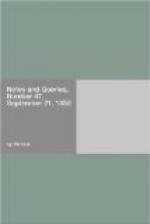Long Lonkin (Vol. ii., pp. 168. 251.).—This ballad does not relate to Cumberland, but to Northumberland. This error was committed by Miss Landon (in the Drawing-room Scrap-book for 1835), to whom a lady of this town communicated the fragment through the medium of a friend. Its real locality is a ruined tower, seated on the corner of an extensive earth-work surrounded by a moat, on the western side of Whittle Dean, near Ovingham. Since this period, I have myself taken down many additional verses from the recitation of the adjacent villagers, and will be happy to afford any further information to your inquirer, SELEUCUS.
G. BOUCHIER RICHARDSON.
Newcastle-upon-Tyne, Sept. 7. 1850.
Havock (Vol. ii., p. 215.).—The presumed object of literary men being the investigation of truth, your correspondent JARLTZBERG will, I trust, pardon me for suggesting that his illustration of the word havock is incomplete, and especially with reference to the line of Shakspeare which he has quoted:
“Cry havock! and let slip the dogs of war.”
Grose, in his History of English Armour, vol. ii. p. 62., says that havok was the word given as a signal for the troops to disperse and pillage, as may be learned from the following article in the Droits of the Marshal, vol. ii. p. 229., wherein it is declared, that—
“In the article of plunder, all the sheep and hogs belong to such private soldiers as can take them; and that on the word havok being cried, every one might seize his part; but this probably was only a small part of the licence supposed to be given by the word.”
He also refers to the ordinance of Richard II.
In agreeing with your correspondent that the use of this word was the signal for general massacre, unlimited slaughter, and giving no quarter, as well as taking plunder in the manner described above, the omission of which I have to complain is, that, in stating no one was to raise the cry, under penalty of losing his head, he did not add the words, “the king excepted.” It was a royal act; and Shakspeare so understood it to be; as will appear from the passage referred to, if fully and fairly quoted:—
“And Caesar’s spirit, ranging for revenge,
With Ate by his side, come hot from hell,
Shall in these confines, with a monarch’s voice,
Cry Havock! and let slip the dogs of war.”
Julius Caesar Act iii.
It is not at this moment in my power to assist F.W. with the reference to the history of Bishop Berkeley’s giant, though it exists somewhere in print. The subject of the experiment was a healthy boy, who died in the end, in consequence of over-growth, promoted (as far as my recollection serves me) principally by a peculiar diet.
W(1).




